Commercial plastic recycling
Save on commercial plastic recycling today
Just enter your business postcode…
Save on commercial plastic recycling today
Just enter your business postcode…
Start saving now
Plastic recycling poses complexities, making it challenging to discern recyclable from non-recyclable materials.
To simplify this process, our experts have prepared the table below, which outlines what plastics are recyclable and are not considered plastic waste.
| Plastic Type | Found in | Can it be recycled? | What is it recycled into? |
|---|---|---|---|
| Polyethylene Terephthalate (PET or PETE) | Drinks bottles, food packaging, and polyester. | Widely recycled | Fibre for clothing and carpets, Bottles and containers. |
| High-Density Polyethylene (HDPE) | Milk jugs, detergent bottles, and plastic bags | Widely recycled | Bottles and containers, pipes and recycling bins. |
| Polyvinyl Chloride (PVC or V) | Pipes, window frames, and certain packaging materials. | Not easily recyclable | Pipes and plumbing fittings, vinyl flooring and window profiles and frames. |
| Low-Density Polyethylene (LDPE) | Plastic bags, cling film, and some packaging. | Recycle at specialist points | Plastic bags and film, rubbish bin liners and bin bags and landscape edging. |
| Polypropylene (PP) | Yoghurt containers, bottle caps and food containers | Widely recycled | Packaging materials, automotive parts, furniture and textiles, |
| Polystyrene (PS) | Foam packaging, disposable cups, and food containers. | Not easily recyclable | EPS briquettes, protective packaging, polystyrene ‘wood’-looking product |
| Other | Used for crisp packets, rice packets | Recycle at specialist points | Plastic pellets, which can then be used in the creation of other useful commodities |
Source: Recycle Now
The array of plastic recycling symbols often poses confusion. To alleviate this, our experts have compiled a concise guide listing recyclable symbols in the UK.
This resource aims to simplify the process, empowering you to know what plastics can be recycled.
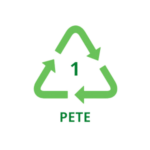
PETE plastic, also known as PET, stands as the most prevalent type of plastic. Remarkably, approximately 70% of all plastic bottles and containers in the United Kingdom are crafted from PETE. Fortunately, PETE is extensively recycled.

HDPE, traditionally favoured in the construction sector for pipe manufacturing, has expanded its utility to include containers like milk cartons and cleaning product bottles. Notably, HDPE is now extensively recycled.
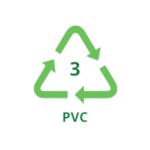
Similar to HDPE, PVC finds common application in the construction industry, notably in crafting items like door and window frames. Encouragingly, PVC is widely recyclable.
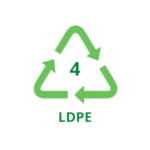
LDPE frequently serves as the material for plastic carrier bags and bin liners. Regrettably, it stands as one of the most commonly discarded types of plastic, with approximately 500 million plastic bags used worldwide each year, of which only a fraction are recycled. Fortunately, there are now initiatives underway to enhance the recycling of LDPE products.
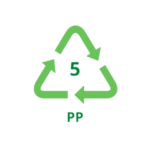
PP plastics are commonly employed in packaging, including plastic tubs, containers, and beverage cartons, as well as in furniture production. Fortunately, this versatile plastic is recyclable.
Plastic waste disposal involves various methods; here are some of the common ways to dispose of plastic waste:

Recycling is one of the most effective methods for managing plastic waste. Plastics can be sorted, cleaned, and processed into new products. Many types of plastic, such as PET and HDPE, are widely recyclable. However, the effectiveness of recycling programs depends on factors such as local infrastructure, collection systems, and market demand for recycled materials.
💡Plastic recycling generally happens abroad; you can read more about this on our waste exports page.

Landfill disposal involves burying plastic waste in designated areas. While landfills are a common method of waste disposal, they can pose environmental risks such as groundwater contamination and greenhouse gas emissions from decomposing plastics.
💡In the UK, waste sent to landfill incurs a landfill tax charge.

Incineration involves burning plastic waste at high temperatures to generate energy. This method can reduce the volume of waste and produce electricity or heat for industrial processes. However, incineration releases air pollutants and greenhouse gases, and certain plastics may emit toxic substances when burned.
💡Advanced incineration technologies, such as gas scrubbers and particulate filters, can help minimise environmental impacts.

Pyrolysis is a niche process that uses thermal decomposition to convert plastic waste into liquid fuels, gases, and char. This method can recover energy from plastic waste while reducing landfill dependence.
💡Suez and German company Pyrum have partnered to build the UK’s first Pyrolysis plant, so although this has yet to be built in the UK.
Source: Suez
Minimising the production of non-recyclable plastic waste is crucial for businesses looking to reduce their environmental impact.
Below are some effective ways for businesses to reduce the use of plastic and decrease the need for recycling.
Find out more in our guide to business waste minimisation.

Wherever possible, replace single-use plastic items with reusable alternatives. For example, use durable glass or stainless steel containers for packaging and storage instead of plastic.

Implement refill stations for products like hand soap, detergents, and cleaning supplies to allow customers and employees to refill their containers, reducing the need for single-use plastic bottles.

Opt for compostable or biodegradable packaging materials from renewable resources such as plant-based plastics, paper, or cardboard. These materials naturally degrade in the environment, reducing the accumulation of plastic waste.

Select packaging materials that are easily recyclable, such as cardboard, paperboard, and certain plastics like PET and HDPE. Label packaging with clear recycling instructions to encourage proper disposal.

Customers and employees should bring reusable bags, containers, and cups when purchasing products or meals. Offer incentives or discounts for customers who bring their containers for takeout or leftovers.

Educate employees about the importance of reducing plastic waste and encourage them to identify opportunities for waste reduction and sustainable practices in their work areas. Provide training on proper waste management and recycling procedures.
The process of recycling plastic involves several key steps:
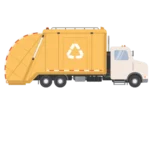
Plastic waste is collected from various sources, including businesses and recycling centres. This can involve kerbside collection, drop-off points, or specialised recycling programs.
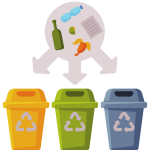
Once collected, plastic waste is sorted based on its type and composition. Different plastics (e.g., PET, HDPE, PVC) are often separated to ensure efficient recycling.
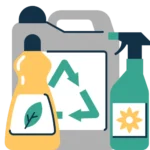
The sorted plastic is cleaned to remove contaminants such as dirt, food residue, or labels. This step is crucial to ensuring the quality of the recycled plastic.

The cleaned plastic is then shredded into small pieces or flakes. This increases the surface area and facilitates the melting process in the next steps.

The shredded plastic is melted down and formed into small pellets or granules through pelletising. These pellets serve as the raw material for manufacturing new plastic products.

Manufacturers use plastic pellets to produce a wide range of products, including bottles, containers, packaging, textiles, and construction materials.
Our waste experts answer your commonly asked questions regarding commercial plastic recycling below:
The recyclability of plastics can vary depending on local recycling facilities and guidelines. While many plastics can be recycled, there are some common types that are often not accepted in recycling programs or are more challenging to recycle:
It’s a common question: why can’t black plastics be recycled in the UK?
The issue lies in the sorting process. When plastic packaging enters the recycling stream, it undergoes sorting into different types of plastics using Near-Infrared (NIR) technology. However, black plastic presents a challenge for NIR lasers because its dark colour absorbs infrared light, making it difficult for the lasers to detect and distinguish from other materials. As a result, black plastic is often not sorted for recycling.
As a consequence, recycling centres commonly discard black plastic items, directing them towards incineration or landfill.
In the UK, businesses must adhere to commercial waste regulations, which is devolved across different locations. Failure to properly manage plastic waste can result in penalties, particularly for commercial waste collection in Wales and commercial waste collection in Scotland.